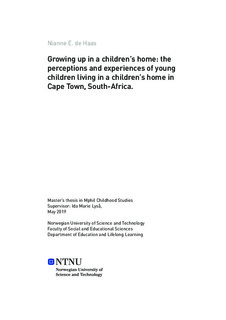| dc.description.abstract | During the last few decades, there has been a growing interest in the experiences and perceptions of young children. Yet, young children are among the ones often left unheard. Young children who are living in children’s homes have many decisions made for them, decisions that could possibly be better fitting in the best interest of the child if the child’s perspective was listened to and given due weight. Therefore, the aim of this thesis is to learn more about the perceptions and experiences of young children who are growing up in a children’s home.
The 9 young non-orphaned children, between 4 and 6 years of age that were part of this research are experts regarding their own perceptions and experiences. This line of thinking is shaped by the research field of Childhood Studies. Childhood Studies, together with a rights-oriented approach and elements of developmental psychology create the theoretical framework on which the methods, methodology and analysis have been based. Through methods such as drawings, interviews, mapping, ranking and play, it has been attempted to gain an understanding of how they experience life in the children’s home.
The children’s home of this particular study is located in Cape Town, South-Africa. It is a home for children from birth till the age of 6. To gain knowledge about the perceptions and experiences of children, it has been important to gain a better understanding of institutionalized life. In the first analysis chapter ‘institutionalized life’, the words of the children will be used to exemplify the impacts this has on children who grow up in the home. This chapter is based on the theory of total institutions as described by Goffman (1961a). It highlights aspects such as restriction in space, time, activity and privacy.
In the second analysis, the focus will be on the ways that children cope with their daily lives and adapt to their new ‘normal’. This chapter is based on theory by Boyden & Mann (2005). Additionally, it includes elements and theories from developmental psychology. This originates from a belief that Childhood Studies allows for children to be heard and valued; for a child’s perspective to be added, whereas developmental psychology can help to gain a better understanding of these perspectives. By applying different coping strategies and relying on social connections, the children learn to cope, as part of their everyday agency (Payne, 2012).
The third analysis dives into the theory of agency and tries to examine the different thickers and thinners of the experiences of agency of the children in the children’s home (Klocker, 2007). It is argued that social connections are a thicker in a situation in which agency is considered thin. This highlights the importance of interdependence, both in the African context and for young children in general.
The hope for this thesis is that it will contribute to the growing body of Childhood Studies research, by adding the experiences of these young children. Additionally, it aims to emphasize the importance of the perspectives of young children and the need to include them in research. | nb_NO |
